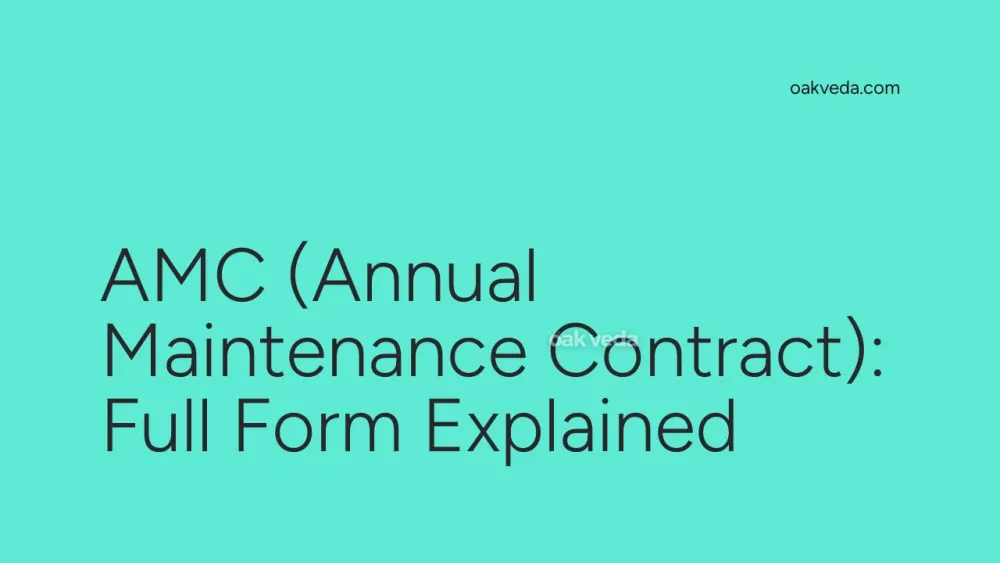
What is the Full Form of AMC?
The full form of AMC is Annual Maintenance Contract. This term is widely used in various industries, particularly in the technology and appliance sectors. An AMC is an agreement between a service provider and a customer that ensures regular maintenance and repair services for a specified period, typically one year.
What is Annual Maintenance Contract?
An Annual Maintenance Contract is a service agreement that provides maintenance and repair services for equipment, machinery, or systems over a fixed period. This contract is designed to ensure the smooth operation of the covered items and to prevent unexpected breakdowns or malfunctions.
Origin and Development of Annual Maintenance Contract
The concept of Annual Maintenance Contracts has been around for several decades, evolving alongside the growth of technology and consumer electronics. As products became more complex and reliant on regular maintenance, manufacturers and service providers recognized the need for structured maintenance plans to ensure customer satisfaction and product longevity.
How does Annual Maintenance Contract work?
Under an AMC, the service provider agrees to perform regular maintenance checks, repairs, and replacements as needed for the covered equipment. The customer pays an annual fee, which may be a fixed amount or a percentage of the product's value. This fee covers all or most of the maintenance and repair costs during the contract period, depending on the terms of the agreement.
Types of Annual Maintenance Contracts
There are several types of AMCs, including:
- Comprehensive AMC: Covers all repairs, replacements, and maintenance costs
- Non-Comprehensive AMC: Covers labor costs but not the cost of replacement parts
- Labor-only AMC: Covers only the cost of labor for repairs and maintenance
- Preventive Maintenance AMC: Focuses on regular check-ups to prevent breakdowns
Functions of Annual Maintenance Contract
The primary functions of an AMC include:
- Regular maintenance and servicing of equipment
- Prompt repair of malfunctioning devices
- Replacement of faulty parts
- Ensuring optimal performance of covered items
- Extending the lifespan of equipment
Applications of Annual Maintenance Contract
AMCs are commonly used for various devices and systems, including:
- Computers and laptops
- Printers and scanners
- Air conditioning units
- Refrigerators and other home appliances
- Industrial machinery and equipment
- Elevators and escalators
- Security systems
Features of Annual Maintenance Contract
Key features of an AMC typically include:
- Scheduled maintenance visits
- Emergency repair services
- Priority customer support
- Discounts on replacement parts (in some cases)
- Detailed documentation of services performed
Benefits of Annual Maintenance Contract
AMCs offer several advantages to both customers and service providers:
- Cost-effective: Helps manage maintenance expenses by spreading costs over time
- Preventive care: Regular check-ups help identify and address potential issues early
- Extended equipment life: Proper maintenance prolongs the lifespan of devices
- Reduced downtime: Quick response times for repairs minimize disruptions
- Peace of mind: Customers can rely on professional support when needed
Limitations or Challenges of Annual Maintenance Contract
While AMCs offer many benefits, there are some potential drawbacks:
- Upfront costs may be high for comprehensive contracts
- Some contracts may have exclusions or limitations on coverage
- Quality of service can vary depending on the provider
- Customers may pay for services they don't ultimately need
Future Developments in Annual Maintenance Contract Technology
The future of AMCs is likely to involve:
- IoT integration: Smart devices that can self-diagnose and report issues
- Predictive maintenance: Using data analytics to anticipate equipment failures
- Remote diagnostics: Troubleshooting and fixing issues without on-site visits
- Customizable plans: Tailored AMCs based on individual usage patterns
- Blockchain-based contracts: Improved transparency and automation in contract management
FAQs on AMC Full Form
-
What is the difference between warranty and AMC? A warranty is typically included with the purchase of a product and covers defects for a limited time. An AMC is an extended service agreement that provides maintenance and repairs beyond the warranty period.
-
Are AMCs worth the cost? AMCs can be cost-effective for high-value or critical equipment where regular maintenance is essential and repair costs can be significant.
-
Can I customize my AMC? Many service providers offer flexible AMC options that can be tailored to specific needs and budgets.
-
What happens if I need service outside of business hours? Many AMCs include provisions for emergency services or extended support hours. Check the terms of your specific contract.
-
Is it possible to cancel an AMC? Cancellation policies vary by provider. Some may offer pro-rated refunds, while others may have cancellation fees or minimum contract periods.
In conclusion, the full form of AMC - Annual Maintenance Contract - represents a valuable service agreement that can help maintain the performance and longevity of various equipment and systems. By understanding the features, benefits, and potential limitations of AMCs, consumers and businesses can make informed decisions about whether these contracts are suitable for their needs.
You may be interested in:
- SKU (Stock Keeping Unit): Full Form and Meaning
- PWD (Public Works Department): Full Form and Functions
- ADCB (Abu Dhabi Commercial Bank): Full Form Explained
- ESIC (Employees' State Insurance Corporation)
- PSU (Public Sector Undertaking): Full Form Explained
- B.Com (Bachelor of Commerce): Full Form and Guide

